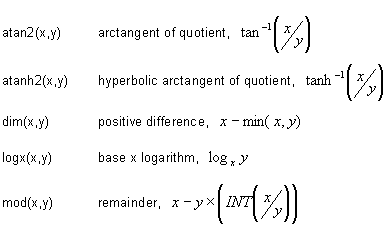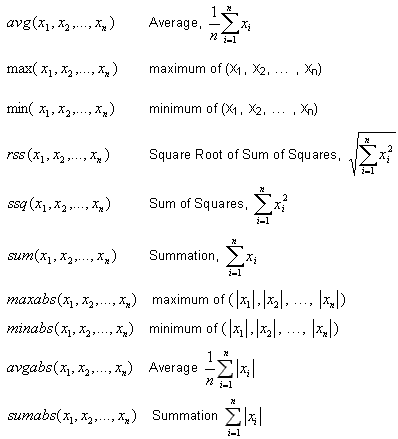/DEQATN
Optimization Keyword Specifies one or more equations for use in optimization.
Format
| (1) | (2) | (3) | (4) | (5) | (6) | (7) | (8) | (9) | (10) |
|---|---|---|---|---|---|---|---|---|---|
| /DEQATN/eqn_ID | |||||||||
| title | |||||||||
| EQN(1); EQN(2); ... | |||||||||
| ... | |||||||||
| EQN(n-1); EQN(n) | |||||||||
Definitions
| Field | Contents | SI Unit Example |
|---|---|---|
| eqn_ID | Design equation
identifier. (Integer > 0) |
|
| title | Title. (Character, maximum 100 characters) |
|
| EQN(i) | i-th
equation. (Character string) |
Example
#---1----|----2----|----3----|----4----|----5----|----6----|----7----|----8----|----9----|---10----|
/DRESP1/1
u_in
### RTYPE=5: Displacement
### PTYPE=1: Node
### ATTA=1 : Translational displacement in X-direction
### ATTI=103 : 103 is node group identifier is due to PTYPE = 1
#---1----|----2----|----3----|----4----|----5----|----6----|----7----|----8----|----9----|---10----|
# RTYPE PTYPE REGION ATTA ATTB ATTI
5 1 1 103
#---1----|----2----|----3----|----4----|----5----|----6----|----7----|----8----|----9----|---10----|
/DRESP1/2
u_out
### RTYPE=5: Displacement
### PTYPE=1: Node
### ATTA=1 : Translational displacement in X-direction
### ATTI=104 : 104 is node group identifier is due to PTYPE = 1
#---1----|----2----|----3----|----4----|----5----|----6----|----7----|----8----|----9----|---10----|
# RTYPE PTYPE REGION ATTA ATTB ATTI
5 1 1 104
#---1----|----2----|----3----|----4----|----5----|----6----|----7----|----8----|----9----|---10----|
/DRESP2/4
dresp2
### EQID=1: /DEQATN identifier is 1
### VARTYPE1=3: Indicates the type of variables is 3 (DRESP1)
### ID1=1: first Variable(x) is ID1=1 in DRESP1 (dx in node group 103)
### ID2=2: second Variable(y) is ID2=2 in DRESP1 (dx in node group 104)
# FUNC EQID REGION
1
# VARTYPE1 ID1 ID2 ID1 ID2 ID1 ID2 ID1 ID2 ID1
3 1 2
#---1----|----2----|----3----|----4----|----5----|----6----|----7----|----8----|----9----|---10----|
/DEQATN/1
deqatn
# EQUATIONS
dm(x,y)=(x+y)/2.
#---1----|----2----|----3----|----4----|----5----|----6----|----7----|----8----|----9----|---10----|Comments
- Blank characters in the equation have no effect, even within a constant, variable or function name. Lower and upper case letters are equivalent.
- There must be only one variable at
the left-hand side of each equation in any equation card. The variable of the first
equation must be followed by an argument listed in the following
format:
v1(x1,x2,…,xn) = expression(x1,x2,…,xn); v2 = expression(x1,x2,…,xn,v1); … vi = expression(x1,x2,…,xn,v1,v2,…,vi-1); … vn = expression(x1,x2,…,xn,v1,v2,…,vn-1);Where,
viis the variable of equation i. (x1,x2, ...,xn) is the argument list for variablev1. (v1,v2,...,vi-1) is the variable list which corresponds to the result of equation 1 through equation I-1. - Constants can
be specified in a format of either integer or floating point. A floating point
number can be in a format of either normal decimal-point format (3.90) or scientific
notation (-2.0E-3), which means -2x10-3.The list of supported mathematical functions is:
- One-argument Functions
- abs(x)
- Absolute value
- acos(x)
- Arccosine
- acosh(x)
- Hyperbolic arccosine
- asin(x)
- Arcsine
- asinh(x)
- Hyperbolic arcsine
- atan(x)
- Arctangent
- atanh(x)
- Hyperbolic arctangent
- cos(x)
- Cosine
- cosh(x)
- Hyperbolic cosine
- exp(x)
- Exponential
- log(x)
- Natural logarithm
- log10(x)
- Common logarithm
- pi(x)
- Multiples of π
- sin(x)
- Sine
- sinh(x)
- Hyperbolic sine
- int (x)
- Real to integer conversion
- sqrt(x)
- Square root
Two-argument functions:
Multi-argument functions:
- The
supported operators are:
Symbol Meaning Example + binary + x + y - binary - x - y * multiplication x * y / division x / y ** power x ** y + unary + +1.0 - unary - -1.0 - The precedence of
mathematical calculations follows the rules of Fortran
language. Parenthesis has a higher priority in the order of precedence than the
operators listed above. Two consecutive operators are acceptable only if the second
one is unary, plus or minus.Examples of operator precedence:
- Expression
- Result
- 2**-3
- 0.128
- 1 / 2 + 3
- 3.5
- 2*3-4
- 2.0
- -2**3**2
- -512.0
- 2 + -5
- -3.0
- 2 * -5
- -10.0
- 2 - -5
- 7.0
- 2/3/4
- 0.16666666....
- 2/(3/4)
- 2.6666666...
- Functions can be defined in a layered format, for example, min(sin(x1), x2), with no limit on the number of layers.
- The /DEQATN entry is referenced by /DRESP2 entry.